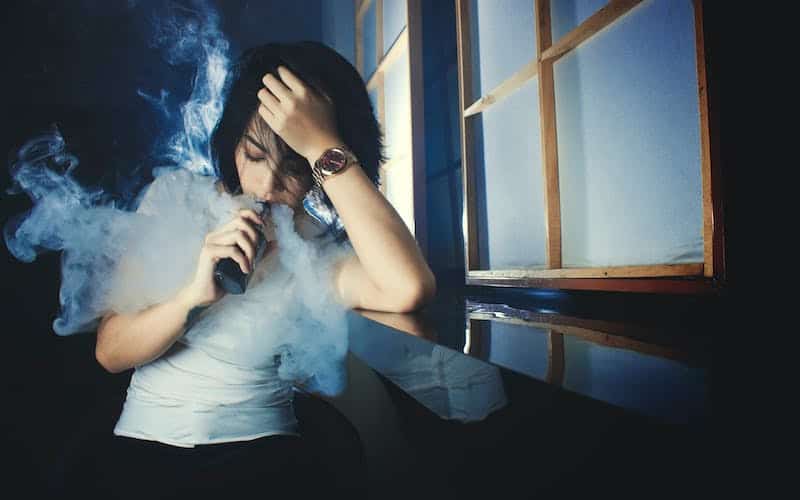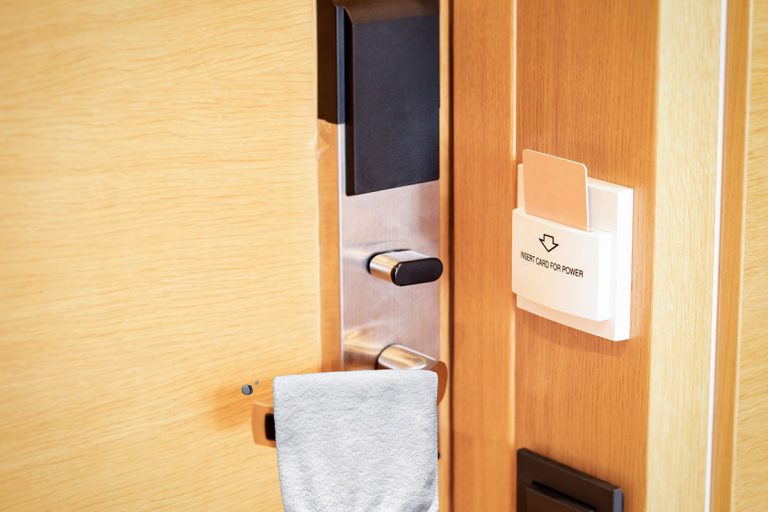Concerned about vaping in hotels? Wondering if it can trigger smoke alarms?
If you’re short on time, here’s a quick answer to your question: Yes, vapes can set off hotel smoke alarms.
In this article, we will explore the science behind how vapes can trigger smoke alarms, the potential consequences, and tips for vaping discreetly in hotels. Let’s dive in and learn more!
Understanding Hotel Smoke Alarms
When it comes to vaping in hotel rooms, one common concern is whether or not it can set off the smoke alarms. To address this concern, it is important to understand how hotel smoke alarms work and why they are sensitive to various types of smoke or particles.

How do hotel smoke alarms work?
Hotel smoke alarms are designed to detect the presence of smoke and alert occupants of a potential fire. These alarms typically use one of two technologies: ionization or photoelectric.
Ionization smoke alarms contain a small amount of radioactive material that ionizes the air inside the alarm. When smoke enters the alarm, it disrupts the ionization process, triggering the alarm to sound. These alarms are more responsive to flaming fires with smaller smoke particles.
Photoelectric smoke alarms, on the other hand, use a light source and a light-sensitive sensor. When smoke enters the alarm, it scatters the light, which then triggers the sensor and activates the alarm. These alarms are more effective at detecting smoldering fires with larger smoke particles.
Why are smoke alarms sensitive?
Smoke alarms are designed to be highly sensitive to even the smallest traces of smoke in order to provide early warning and protect lives. This sensitivity is crucial because fires can spread rapidly, and early detection can make a significant difference in minimizing damage and ensuring the safety of hotel guests.
Hotel smoke alarms are designed to detect a wide range of smoke particles, including those produced by burning materials such as paper, wood, plastic, and fabrics. While the sensitivity of smoke alarms can vary, they are generally designed to detect smoke particles as small as 0.01 to 0.03 microns in size.
It is worth noting that vaping devices produce aerosols, which may contain particles that can trigger smoke alarms. While the particles produced by vaping are generally smaller and less dense than those produced by combustible materials, they can still potentially activate smoke alarms, especially if used in close proximity to the alarm.
Therefore, it is advisable to avoid vaping in hotel rooms to prevent any potential inconvenience or false alarms. Remember, it is always better to be safe and respectful of others’ safety when staying in a hotel.
How Vapes Can Trigger Smoke Alarms
Vaping has become a popular alternative to smoking traditional cigarettes. However, many people wonder if vapes can set off smoke alarms, especially in sensitive areas like hotel rooms. Let’s explore the composition of vape aerosols and their potential effects on smoke alarms.
Composition of vape aerosols
Vape aerosols are created when e-liquids, which typically contain a mixture of propylene glycol, vegetable glycerin, flavorings, and nicotine, are heated by the device.
When these substances are vaporized, they form a cloud of tiny particles that are inhaled by the user. It is important to note that vape aerosols are different from smoke produced by burning tobacco, as they do not contain the same harmful chemicals.
While vape aerosols are generally considered less harmful than cigarette smoke, they do contain certain substances that may be detected by smoke alarms.
For example, some smoke detectors are sensitive to particles of a certain size or may be triggered by certain odors. These factors can contribute to the activation of smoke alarms when using vapes in close proximity.

Effect of vape aerosols on smoke alarms
Studies have shown that vape aerosols can indeed set off smoke alarms, although the likelihood may vary depending on the sensitivity of the alarm and the proximity of the vape device to the detector.
The particles and odors released by vapes can sometimes be mistaken as smoke by smoke detectors, leading to false alarms.
It is important to note that not all smoke alarms are equally sensitive to vape aerosols. Some newer models are specifically designed to differentiate between smoke and other types of aerosols, reducing the occurrence of false alarms. However, it is always best to exercise caution when vaping in areas where smoke alarms are present.
To minimize the chances of triggering smoke alarms, consider the following tips:
- Ensure proper ventilation in the room to help disperse vape aerosols.
- Keep a safe distance between the vape device and the smoke alarm.
- Consider using a designated vaping area that is separate from areas with smoke alarms.
- Contact the hotel or establishment beforehand to inquire about their policies on vaping.
Consequences of Setting Off Smoke Alarms
Evacuation and Inconvenience
Setting off a smoke alarm in a hotel can have several consequences, the most immediate being the evacuation of the building.
When a smoke alarm is triggered, hotel staff and emergency responders will take it seriously and initiate evacuation procedures to ensure the safety of all guests and staff. This can be highly inconvenient for guests who may be forced to leave their rooms and wait outside until the situation is resolved.
Evacuations can disrupt travel plans, cause delays, and create frustration among guests who were looking forward to a relaxing stay.
In addition to the inconvenience of evacuation, setting off a smoke alarm can also lead to further inconveniences.
Once a smoke alarm is triggered, it typically requires a thorough investigation to determine the cause. This may involve hotel staff and fire department personnel inspecting the room or area where the alarm was activated.
This investigation can take time and may result in additional inconveniences such as temporarily closing off the area or even relocating guests to different rooms.
Financial Repercussions
Setting off a smoke alarm in a hotel can also have financial repercussions for both the guest and the hotel.
In some cases, hotels may charge guests for the costs associated with false alarms, including the cost of investigation, potential repairs, and any lost revenue due to the disruption caused.
These charges can vary depending on the hotel’s policies and the extent of the incident. It is important for guests to be aware of any potential charges that may apply if they accidentally set off a smoke alarm.
For hotels, false alarms can be costly as well. The time and resources required to investigate the cause of the alarm, as well as any necessary repairs or maintenance, can add up quickly.
Additionally, false alarms can negatively impact a hotel’s reputation, leading to potential loss of business and revenue. Hotels have a responsibility to ensure the safety and comfort of their guests, and false alarms can undermine this commitment.
Therefore, it is essential for individuals to be mindful of their actions and take precautions to avoid setting off smoke alarms unnecessarily.
This includes being aware of the potential impact of vaping in hotel rooms and understanding the potential consequences if a smoke alarm is triggered. By doing so, guests can help maintain a safe and enjoyable atmosphere for themselves and others, while hotels can minimize the disruptions and costs associated with false alarms.
Tips for Vaping Discreetly in Hotels
Choose the right location
When it comes to vaping in hotels, choosing the right location is key. While some hotels have designated smoking areas, it’s important to note that vaping may not be allowed in these areas.
To avoid any issues, it’s best to vape in a well-ventilated area, such as near an open window or balcony. This will help to disperse the vapor quickly and minimize the chances of setting off the smoke alarm.
Additionally, consider selecting a hotel room with a smoke-free policy, as these rooms are less likely to have smoke detectors that are sensitive to vapor.
Use odorless e-liquids
One way to vape discreetly in hotels is to use odorless e-liquids. These e-liquids are specially formulated to produce little to no smell when vaporized. By using odorless e-liquids, you can enjoy vaping without drawing attention to yourself or triggering any smoke alarms.
It’s important to note that not all e-liquids are odorless, so be sure to check the product description or ask your local vape shop for recommendations.

Minimize exhalation near the smoke alarm
While vaping in a hotel room, it’s crucial to be mindful of the proximity to the smoke alarm. Exhaling vapor directly towards the smoke alarm can increase the chances of setting it off. To minimize this risk, try to exhale the vapor away from the smoke alarm or towards a well-ventilated area.
Additionally, consider using a technique called “stealth vaping,” where you take smaller puffs and hold the vapor in for a few seconds before exhaling. This can help to reduce the amount of vapor that is released into the air and decrease the likelihood of triggering the smoke alarm.
Remember, it’s always important to respect the rules and regulations of the hotel you are staying in. If vaping is prohibited in your hotel, it’s best to find alternative areas outside of the hotel premises where vaping is allowed. By following these tips, you can enjoy a discreet vaping experience while minimizing the risk of setting off smoke alarms.
Legal and Ethical Considerations
Hotel policies on vaping
When it comes to vaping in hotels, it is crucial to understand and respect the policies that each establishment has in place.
With the rise in popularity of vaping, many hotels have implemented specific rules regarding the use of e-cigarettes and vape devices on their premises. These policies can vary from hotel to hotel, so it is important to familiarize yourself with the rules before deciding to vape during your stay.
Some hotels may have designated smoking areas that include vaping, while others may prohibit vaping altogether.
It is always a good idea to check the hotel’s website or call ahead to inquire about their policy on vaping. This will ensure that you are aware of the rules and can make an informed decision about whether or not to bring your vape device with you.
Additionally, some hotels may charge a cleaning fee if evidence of vaping is found in the room.
This fee is typically imposed to cover the cost of removing any lingering odors or residue left behind by vaping. To avoid any unexpected charges, it is best to adhere to the hotel’s policy and vape only in designated areas, if permitted.
Respecting other guests’ rights
While it may be tempting to enjoy your vape device in the comfort of your hotel room, it is important to consider the rights and preferences of other guests. Not everyone may be comfortable with or enjoy the smell or sight of vaping.
When staying in a hotel, it is essential to be mindful of the potential impact your actions may have on others. Even if the hotel permits vaping, it is courteous to step outside or use designated areas to vape, away from common areas and other guests.
Respecting the rights of other guests also extends to being aware of any potential health concerns. Some individuals may have allergies or sensitivities to certain ingredients or components of vape devices. By being considerate and vaping responsibly, you can ensure that everyone’s stay is enjoyable and comfortable.
Remember, hotels aim to provide a pleasant experience for all guests, and by following their policies and respecting the rights of others, you can contribute to a positive and harmonious atmosphere during your stay.
Conclusion
In conclusion, vaping in hotel rooms can indeed set off smoke alarms due to the composition of vape aerosols. This can lead to inconveniences such as evacuation and potentially financial repercussions.
If you choose to vape in a hotel, it is crucial to be considerate and follow the tips provided to minimize the chances of triggering smoke alarms. Always check the hotel’s policies on vaping and respect the rights of other guests.
By being mindful and informed, you can enjoy your vaping experience without causing any disruptions during your hotel stay.






